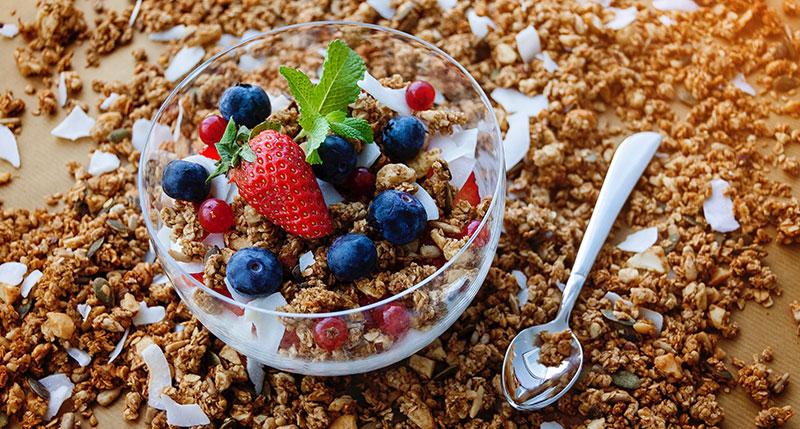In our last post, we learned that the gut microbiome is a community of bacteria, fungi, parasites and viruses that lives in your large intestine and can affect everything from your weight to your immune system and your moods. Scientists are still learning about its far-reaching effects but it’s safe to say that being knowledgeable about your personal gut microbiome and how you can keep it balanced is essential.
What exactly are probiotics?
You’ve likely seen advertisements stating that probiotics promote digestive health, but what exactly are they?
Basically, probiotics are either foods that naturally contain microbiota or supplements that contain live active bacteria – the good kind of bacteria that can make you feel better and help reduce weight.
Probiotics occur naturally in fermented foods like yogurt, sauerkraut, tempeh, kombucha tea, pickled vegetables, miso and kimchi.
However, it is never guaranteed that these microbes will colonize in your gut when they get there or if they offer benefits to already healthy people.
That said, when you must take antibiotics or if you suffer from irritable bowel syndrome, there is evidence that consuming probiotics is a good idea.
“Probiotics can also be most effective at both ends of the age spectrum because that’s when your natural microbes aren’t as robust,” explains Dr. Allan Walker, a Professor of Nutrition at Harvard Medical School. “You can influence this huge bacterial colonization process more effectively with probiotics during these periods.”
Still, Walker clarifies that “these are circumstances when there’s a disruption of balance within the intestine. If you’re a healthy adult or older child who isn’t on antibiotics, giving a probiotic isn’t going to be overly effective in generally helping their health.”
There are prebiotics too? What are those?
Prebiotics are nondigestible fiber compounds that stimulate the growth of beneficial microorganisms in the gastrointestinal tract.
Prebiotics are found in fruits and vegetables such as artichokes, asparagus, bananas, onions, garlic, leeks and seaweed. Whole grains like barley, wheat and oats are also excellent sources of prebiotic fibers.
Like probiotics, prebiotics need to be introduced gradually and used in moderation to avoid bloating and gas. Tolerance to both probiotics and prebiotics may improve with continued use over time.
According to healthline.com, here are some other ways to support or improve your gut microbiome:
- Eat a diverse diet: Diversity in your diet creates a diverse gut microbiome, which creates a healthy gut. It’s that easy! Foods including beans, grains, vegetables, fruits and yogurts all encourage the growth of healthy bacteria.
- Minimize artificial sweeteners: Aspartame and other artificial sweeteners stimulate the growth of unhealthy gut bacteria. Best to remove those from your diet.
- Plants, please! Plant-based diets reduce exposure to E.coli and other disease-causing bacteria. Vegetarian diets also lead to lower cholesterol levels and less inflammation.
- Polyphenols, please! Red wine, dark chocolate, green tea, whole grains and olive oil all contain plant compounds called polyphenols, which stimulate healthy bacteria growth.
- Antibiotics, only when needed: Antibiotics disrupt the normal balance found in a healthy microbiome by killing many good and bad bacteria. This can lead to antibiotic resistance and even weight gain.
- Increase physical activity: We all know that working out has many benefits, but did you know that it also increases helpful bacteria in the gut? It does.
- Sleep well: Inconsistent sleep patterns have adverse effects on your gut bacteria and can throw off the body’s normal, restorative circadian rhythm.
- Reduce stress: In the gut, stress can increase sensitivity, reduce blood flow and reduce the friendly bacteria that boost our immune systems.
Your gut microbiome is a dynamic, living environment where the variety of bacteria, viruses, parasites and fungi fluctuate constantly depending on medication, exercise, diet and many other environmental influences. While researchers are only just beginning to understand the extent of the microbiome’s role in health, it’s clear that taking the proactive steps above can only help in creating and maintaining the healthy equilibrium needed in your personal gut microbiome.

